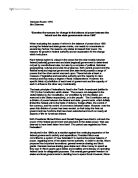Is the EU a federal state?
The main objectives of this paper are three: trace out the differences between federalists and intergovernmentalist in the building of the Union; find out, by looking at other federations, what makes a state federal, and then conclude whether the EU is presently, or moving towards to, a federal state.
Federation - the ultimate peace treaty
Proposals for a federalist unification of Europe came already in the 18th century. For Immanuel Kant, the federation was a means of achieving a perpetual peace. He saw the solution to trouble not in treaties but in a federation of peoples. Treaties were meant to be discarded. This federation, he argued has no aim to acquire any power like that of a state, but merely to preserve and sevure the freedom of each state in itself. This is, I think what brought the first efforts towards European Integration in the post-war period. For Winston Churchill, the United States of Europe would ensure peace, safety and freedom. The main thought behind Monnet's and Schumann's proposals for integration had as their main aim the control of Germany. Like Kant, Schuman in his Declaration states that the pooling of coal and steall will lead to the first concrete federation of a European federation - which, like Kant stressed, is indispensable to the preservation of peace.
There were two different 'federal' approaches in the post-War period. On the one hand we have Monnet's functionalism : a step by step construction of Europe, with successive layers becoming easier to achieve due to spill-over events. On the other hand we have Spinelli's constitutionalism. He believed in preparing a constitution and ratifying it. This second possibility proved to be impossible in the post-war period. Most of the West European states had just regained their status as sovereign nation states after World War II, were unwilling to loose such a significant account of their sovereignity in favour of a federal Europe. The only supranational institution was the High Authority. However the pro-federalist had to face a number of distinct politicians who did not believe that a federal Europe was the solution. Two of these were General Charles de Gaulle, and Mrs. Margaret Thathcer. De Gaulle argued that 'at present there is and can be no Europe other than a Europe of the States'.'Thatcher's arguments revolved around the concept of 'family of nations'; she promoted co-operation between independent sovereign states and explained that efforts and centralization have been unsuccessful elesewhere, citing the Soviet Union as an example.
The main objectives of this paper are three: trace out the differences between federalists and intergovernmentalist in the building of the Union; find out, by looking at other federations, what makes a state federal, and then conclude whether the EU is presently, or moving towards to, a federal state.
Federation - the ultimate peace treaty
Proposals for a federalist unification of Europe came already in the 18th century. For Immanuel Kant, the federation was a means of achieving a perpetual peace. He saw the solution to trouble not in treaties but in a federation of peoples. Treaties were meant to be discarded. This federation, he argued has no aim to acquire any power like that of a state, but merely to preserve and sevure the freedom of each state in itself. This is, I think what brought the first efforts towards European Integration in the post-war period. For Winston Churchill, the United States of Europe would ensure peace, safety and freedom. The main thought behind Monnet's and Schumann's proposals for integration had as their main aim the control of Germany. Like Kant, Schuman in his Declaration states that the pooling of coal and steall will lead to the first concrete federation of a European federation - which, like Kant stressed, is indispensable to the preservation of peace.
There were two different 'federal' approaches in the post-War period. On the one hand we have Monnet's functionalism : a step by step construction of Europe, with successive layers becoming easier to achieve due to spill-over events. On the other hand we have Spinelli's constitutionalism. He believed in preparing a constitution and ratifying it. This second possibility proved to be impossible in the post-war period. Most of the West European states had just regained their status as sovereign nation states after World War II, were unwilling to loose such a significant account of their sovereignity in favour of a federal Europe. The only supranational institution was the High Authority. However the pro-federalist had to face a number of distinct politicians who did not believe that a federal Europe was the solution. Two of these were General Charles de Gaulle, and Mrs. Margaret Thathcer. De Gaulle argued that 'at present there is and can be no Europe other than a Europe of the States'.'Thatcher's arguments revolved around the concept of 'family of nations'; she promoted co-operation between independent sovereign states and explained that efforts and centralization have been unsuccessful elesewhere, citing the Soviet Union as an example.







